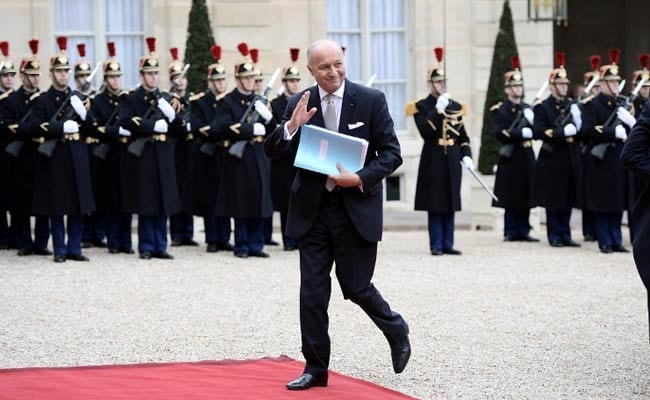
Laurent Fabius has previously called for an international support group to put pressure on the two sides to compromise. (AFP)
JERUSALEM:
Israel would consider a French invitation to peace talks with the Palestinians, but believes France has made a mistake by saying it will recognise a Palestinian state if the talks fail, an Israeli government official said on Saturday.
"If and when we get an invitation to a conference, we will examine it and respond to it," the official, who declined to be named, said in a statement.
French Foreign Minister Laurent Fabius told foreign diplomats on Friday that if the conference he proposes hit a wall, "well ... in this case, we need to face our responsibilities by recognising the Palestinian state".
The Israeli official dismissed the idea, saying: "Why would the Palestinians budge on even a comma in a conference if they already know that, without making progress, they will get what they want?"
Palestinian President Mahmoud Abbas, speaking to African leaders at a summit in Ethiopia, urged them to back France's conference plan.
But two Israeli cabinet ministers, both allies of Prime Minister Benjamin Netanyahu, said Israel should boycott such a meeting.
"Unequivocally, Israel will not attend a conference under threat," Transportation Minister Yisrael Katz told Channel 2 television, echoing a comment by Energy Minister Yuval Steinitz to Channel 1.
Peace Efforts Stalled
US-led efforts to broker a "two-state solution" collapsed in 2014, and there has been no serious attempt to revive them.
Fabius has previously called for an international support group comprising Arab states, the European Union and UN Security Council members to put pressure on the two sides to compromise. But Netanyahu has called France's initiatives "counterproductive".
A US official responded cautiously to Fabius's statement.
"The U.S. position on this issue has been clear. We continue to believe that the preferred path to resolve this conflict is for the parties to reach an agreement on final status issues directly," the official said.
Despite anger in the US administration over Israeli settlement building, there is little prospect of President Barack Obama supporting any initiative that could upset the US Jewish lobby 10 months before an election.
UN Secretary-General Ban Ki-moon has called Israel's expansion of Jewish settlements in occupied land "provocative" and said that it raises questions about its commitment to a two-state solution.
Palestine has non-member observer status at the United Nations and its flag flies with those of member states at UN headquarters in New York. Sweden became the first member of the European Union to recognise a Palestinian state in 2014, and several other states have followed.
Palestinians seek a state in Gaza, the West Bank and East Jerusalem, parts of which have been occupied by Israel since 1967.
"If and when we get an invitation to a conference, we will examine it and respond to it," the official, who declined to be named, said in a statement.
French Foreign Minister Laurent Fabius told foreign diplomats on Friday that if the conference he proposes hit a wall, "well ... in this case, we need to face our responsibilities by recognising the Palestinian state".
The Israeli official dismissed the idea, saying: "Why would the Palestinians budge on even a comma in a conference if they already know that, without making progress, they will get what they want?"
Palestinian President Mahmoud Abbas, speaking to African leaders at a summit in Ethiopia, urged them to back France's conference plan.
But two Israeli cabinet ministers, both allies of Prime Minister Benjamin Netanyahu, said Israel should boycott such a meeting.
"Unequivocally, Israel will not attend a conference under threat," Transportation Minister Yisrael Katz told Channel 2 television, echoing a comment by Energy Minister Yuval Steinitz to Channel 1.
Peace Efforts Stalled
US-led efforts to broker a "two-state solution" collapsed in 2014, and there has been no serious attempt to revive them.
Fabius has previously called for an international support group comprising Arab states, the European Union and UN Security Council members to put pressure on the two sides to compromise. But Netanyahu has called France's initiatives "counterproductive".
A US official responded cautiously to Fabius's statement.
"The U.S. position on this issue has been clear. We continue to believe that the preferred path to resolve this conflict is for the parties to reach an agreement on final status issues directly," the official said.
Despite anger in the US administration over Israeli settlement building, there is little prospect of President Barack Obama supporting any initiative that could upset the US Jewish lobby 10 months before an election.
UN Secretary-General Ban Ki-moon has called Israel's expansion of Jewish settlements in occupied land "provocative" and said that it raises questions about its commitment to a two-state solution.
Palestine has non-member observer status at the United Nations and its flag flies with those of member states at UN headquarters in New York. Sweden became the first member of the European Union to recognise a Palestinian state in 2014, and several other states have followed.
Palestinians seek a state in Gaza, the West Bank and East Jerusalem, parts of which have been occupied by Israel since 1967.
© Thomson Reuters 2016
Track Latest News Live on NDTV.com and get news updates from India and around the world

